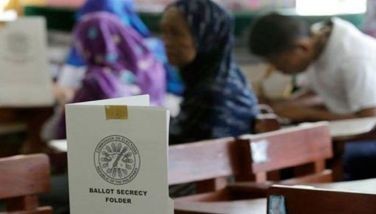Changing mis-spelled name difficult? Compañero's bill offers easyway out
What if your name is Abigail and then you suddenly found out that your name at the civil registry was spelled Abigil? Or your family name is Dimasangkay but your registered family name was Demasangcay? Or you thought all along that your name was Nelly or Mabel, only to find out later that it was spelled at the civil registrar's office as Nellie or Amabel?
Or, what if your actual date of birth is different from what was registered at the civil registrar's office?
There are thousands whose names were mis-spelled or whose dates of birth were wrongly entered at the civil registry. These errors, which at first seemed to be a source of amusement, would later give headaches to those with unintended "aliases" while they enrolled in high school or college, processed travel documents or filed an application for a professional board examination.
At present, their only legal recourse to correct the erroneous entries is to go to the courts. This, however, is very tedious, time consuming and expensive. Most have to live their lives with a name mangled by a civil registrar who did not know how to spell.
There is a less cumbersome but illegal way of correcting a misspelled name, and that is by registering the person's birth a second time. A person previously registered in one place is registered for a second time in another place, sometimes with a different birthday, with the only expense the penalty for delayed registration. Others try to secure fake birth certificates from a syndicate in the hope that the illicit method would not be detected.
Sen. Renato Cayetano has sought to ease the problem of these persons by filing a bill that would simplify and make less tedious the correction of clerical errors in the civil registry.
Cayetano, chairman of the Senate committee on justice and human rights, noted that aside from the tedious and expensive process of correcting mis-spelled names, the filing of petition to correct the entry also clogs further the dockets of courts.
"Once this bill is approved, interested parties no longer have to spend up to P25,000 to correct an error in an entry in the civil registry," he said.
His Senate Bill No. 2027 seeks to amend the Civil Code by authorizing city and municipal civil registrars to correct or change clerical or typographical errors in the civil registry without need of a judicial order.
Under the measure, any person with direct and personal interest in the correction of clerical or typographical error in the civil registrar may file in person a verified petition with the local civil registry office where the record being sought to be corrected is kept.
If the interested party has moved to another province and it would not be practical for him to appear in person before the office keeping the documents to be corrected, then he may file a petition with the provincial statistics officer in the province where he has moved.
Citizens residing in foreign countries may file their petition in person with the nearest Philippine consulate.
Cayetano said that the decision of a local civil registrar shall be subject to automatic review by the Civil Registrar General, who should act on it within 10 days after receipt of the decision, otherwise it shall become final and executory.
"If the Civil Registrar General finds that the correction is not clerical or typographical in nature, or is one that affects the civil status of the petitioner, he may set aside the decision of the concerned local registrar and advice the petitioner to go to the courts instead," Cayetano said.
- Latest
- Trending





























